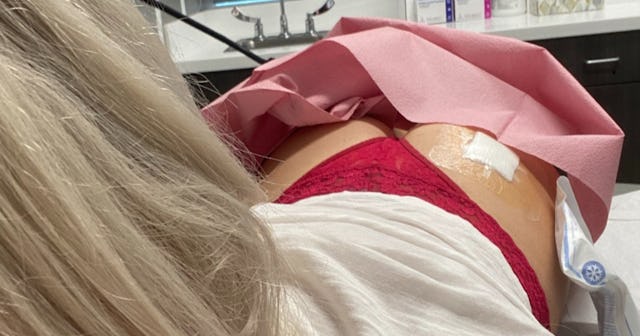I Thought I Was Dying — Until My Doctor Put Something In My A**

Three years ago, I spent many a night online trying to diagnose the malady ravaging my body. Lupus … MS … Muscular Dystrophy … brain tumors … bone cancer … I was certain there was something terribly wrong with me. I knew the diagnosis was dire given I was just 35 and experiencing the following symptoms:
Constant And Inescapable Fatigue
Every day felt like an uphill trek through deep pluff mud. I could get through most days powered by caffeine or similar stimulant, but every day by 3pm, the fatigue, stress, and body aches would consume me. Advil, coffee, and a hard drink seemed the only combination to power me through until bedtime.
Exercise Intolerance
I have always loved to exercise and its role in my daily life is just as valuable for my mental health as it is my physical health. But exercise would make it all worse. I would have to go horizontal after working out, feeling as if my body was shutting down on me. There were no endorphins, or post-workout bliss. In fact, I was often incredibly nauseous.
Constant Aches And Pains
Everything always hurt. My hips, my legs, my shoulder blades, my head. Something was always aching, throbbing, or knotted up.
Brain Fog
Though I have never been known for my memory, I was having moments of brain fog so intense that I struggled to find common words, or recall names of people I had known for years.
Mood Swings
Actually, it would probably be more accurate to just call me moody, no swing. I lived with a sense of almost constant irritation or sense of overwhelm. (Though this was probably the symptom most obvious to everyone else, it was the least concerning to me. I didn’t consider it a symptom but more of a general indication of how annoying everyone in my life had become.)
Then one night in my doomsday hypochondria research, I stumbled upon the symptoms of low testosterone in women and felt more understood, and thus, more hopeful, than I had in years.
I went to a hormone specialist and had blood work, as well as a day’s worth of urine samples collected. (Apparently our hormones fluctuate quite a bit, or should, throughout the day.)
It was confirmed. My body didn’t have enough testosterone, and the amount that it did have, it struggled to convert to use. There’s a lot more information and science behind that very elementary takeaway, but that’s as versed as I can explain to another.
Not only did I now have answers, I also had a solution. The doctor implanted a testosterone pellet, the size of a grain of rice, into the skin of my tush near my hip. I try not to look or inquire as to exactly what’s being done back there, but all I know is that after the sharp sting of the Lidocaine, I feel nothing and in a couple of minutes am sent on my way with an ice pack.
Additionally, on days 12 – 28 of my cycle, I take progesterone nightly. I’m not entirely sure why — something to do with supporting my continued menstrual cycle in conjunction with the testosterone — but those pills make for a solid night sleep and a general sense of well-being. If something is working well for me, I tend to ask less questions.
It wasn’t an immediate and noticeable cure-all after the first pellet. But after the second, and especially after the third, I was a new woman. Energy, stamina, clarity, good sleep, and a steady emotional state were all mine. As a bonus, my periods are also less painful and less intense. The fact that men have this as their predominant hormone, flowing freely and plentifully, is really an incredible unfair advantage in life.
Speaking of which … yes, a boost of testosterone does increase the sex drive. Mine was pretty healthy and more male-like compared to most of my female friends to begin with, so I have to assume that with this boost, I am even more aligned with the average man’s drive.
How and why did my hormones get out of whack? Who knows. There are a multitude of possible explanations. I was on birth control for 15 years and then within two weeks of tossing those pills was pregnant with my first child, then again shortly thereafter. These last five years are the first time my hormonal system is working completely on its own.
My gynecologist, the fabulous Dr. Alyse Kelly-Jones, now administers my pellet insertion every three months. Shockingly, my insurance now even covers a portion of the cost. (Side note: I would highly encourage you to go the route of your OB GYN provider vs. a hormone specialist or treatment center which is where I initially started. I’ve heard there can be safety issues, but my bigger issue was the outrageous price gouging. First, a $250 “administrative fee” for a single phone call to tell me to go get my blood work completed, then $400 for the blood work itself. And this is all before any actual procedure takes place. No thanks.)
So if you relate to any of these symptoms, go get those hormones checked. Push through the mental and emotional fatigue of considering the task and all it entails (I get it) and do it now. Life is too short to not feel good!
This article was originally published on